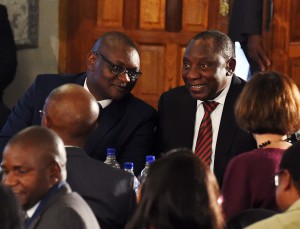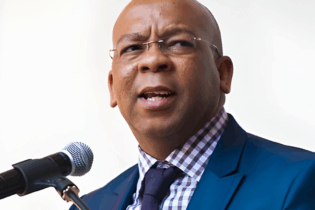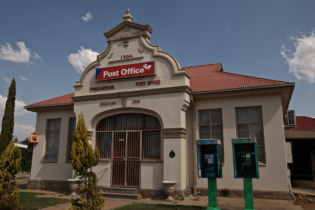
Gauteng Premier David Makhura and Deputy President Cyril Ramaphosa at the Gauteng Economic Indaba
Speaking at the Gauteng Economic Indaba currently underway on Johannesburg, Gauteng Premier David Makhura said the Gauteng government had come to a conclusion that infrastructure is a critical driver of economic growth. This is a driving factor behind the province’s recently adopted 15-year Gauteng Infrastructure Master Plan which was launched at the event.
According to Makhura, the Gauteng Infrastructure Master Plan will be supported by aggressive interventions to cut red tape and reduce the cost of doing business in the Gauteng City Region.
Makhura announced during his State of the Province Address in February this year that a new Provincial Economic Plan had been formulated. “The plan will focus on positioning Gauteng strategically in relation to the SADC region, African continent, BRICS countries and major economies in the world which are compatible with the province’s own economy,” said Makhura.
The purpose of the Gauteng Economic Indaba is to solicit inputs from various stakeholders on the draft Gauteng City Region’s (GCR) Economic Plan. It comes at a time when, as Finance Minister Pravin Gordhan put it, there is a great deal of pessimism both globally and in the South African economy.
The minister emphasised the need for action rather than plans.
“People who have an interest in South Africa, including ourselves, don’t want any more plans. What they want is action. They don’t want to hear about promises. They want to see the milestones that they can watch that will give us an indication that we are actually trying to achieve the objectives that we have set,” he said
Investing in infrastructure
“We estimate that in the next 15 years we will need an additional investment of more than R1.3 trillion to invest social and economic infrastructure. Specifically we will be investing in energy, water, broadband connectivity, public transport and building new mega human settlements and post-apartheid cities,” said Makhura.
“We are pleased to announce that, working with the private sector, we are making significant progress in strengthening infrastructure investment in the key areas we have identified.”
The Gauteng Provincial government’s infrastructure vision is to ensure an inclusive and competitive GCR though equitable access, sustainability, connectivity, spatial justice and mobility which are all underpinned by good governance
Building the economy though the NDP
Deputy President Cyril Ramaphosa has hailed the Gauteng Provincial Government for hosting the inaugural Gauteng Economic Indaba saying it is about building partnership between government, business, labour and communities for long term growth.
One of the main aims of the Indaba is to give effect to the National Development Plan (NDP). In doing so, it recognises that the NDP is a plan for the nation, not just government, said Ramaphosa.
“The NDP identifies the creation of employment as the most important instrument for tackling poverty and inequality. To achieve this, we need faster, more inclusive growth. We need an economy that serves the interests and meets the needs of the people. Investment in infrastructure is key to this,” he said.
Creating a skills revolution
“Central to the economic future of our country is the development of the skills of its people,” said Ramaphosa. “It is only through effective education and skills development that the vast potential of our nation will be realised.”
Addressing the Gauteng Economic Indaba gala dinner last night, African Union Chairperson Dr Nkosazana Dlamini Zuma said the African Union Agenda 2063 plan gives Gauteng a unique opportunity to invest in its people.
“Gauteng has the opportunity to contribute to the skills revolution. This contribution could result in the provision of relevant skills to grow our economy by amongst others developing faculties, academies, institutes and centres of learning that feed our economy with relevant skills.
“We must pay attention to our tertiary level skills and expertise since these is urgently required to grow and modernize our economies, particularly the Science, Technology, Engineering and Math (STEM) skills,” said Dlamini Zuma.
The AU chair painted a bleak picture: “According to the African Capacity Building Foundation, we are currently producing a split of about 90% social science related skills in contrast to about 10% in the STEM areas.”
She said this needed to change urgently if South Africa wanted to lead the skills revolution in the African continent.
Dlamini Zuma said that through technology the province can grow the skills base.
According to Makhura, investing in skills development forms one of the provincial government’s key interventions to effect structural transformation of the economy. By investing in skills development, the aim is to change the skills profile of the citizenry in line with the new strategic sectors and modern industries and breaking the cycle of youth unemployment.








